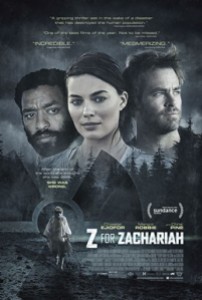 The indie drama “Z for Zachariah” is a post-apocalyptic sci-fi in name only. Movies such as this year’s “Ex Machina” or the horror film “The Babadook” have played with genre as their setting to tell what is essentially a contemporary story. The scene and the plot are merely set dressing for a bigger parable.
The indie drama “Z for Zachariah” is a post-apocalyptic sci-fi in name only. Movies such as this year’s “Ex Machina” or the horror film “The Babadook” have played with genre as their setting to tell what is essentially a contemporary story. The scene and the plot are merely set dressing for a bigger parable.
Craig Zobel’s (Compliance) film however maintains such a tenuous relationship to its post-apocalyptic scenario that it’s a wonder he didn’t do away with it entirely. “Z for Zachariah” follows the survivor of a radiation outbreak living peacefully alone in her country farm and how she comes to care and love another survivor who stumbles across her home.
More so than a sci-fi, “Z for Zachariah” is a marital romance, and eventually a love triangle. It deals with questions of intimacy, faith, commitment, trust, personality and habit. None of the preceding has much to do with the act of surviving a nuclear outbreak, but these themes are contained in well-drawn and acted characters and a tender, theatrical scope.
Ann (Margot Robbie) is a country girl living in her secluded slice of the world, a valley that has remained untainted by radiation and the effects that seem to have wiped out humanity. John (Chiwetel Ejiofor) is another resourceful survivor who has made his way to the valley, only to fall sick and in need of Ann’s help for survival.
In them we see how tragedy, need and circumstance has brought out their core beliefs. It’s a battle of faith versus science, as Ann falls back on her Christian upbringing to help her sustain, while John is analytical and logical. He devises a plan to bring electricity back to her farm, but only at the expense of tearing down Ann’s cherished chapel.
They grow close and nearly intimate but withhold their temptations. These things need time, and they’ve got nothing but time, John explains. That changes when the drifter-type Caleb (Chris Pine) arrives on their doorstep. He’s a slick country boy with an equal helping of faith that John lacks, and his mere presence consistently makes him an untrustworthy figure driving a stake between Ann and John.
Ejiofor quite often steals the show, paring dialogue down to its quietest and simplest. He just seems profound and shrouded in feeling no matter when he’s speaking, including a bombshell about his past before arriving on the farm. But he even gets the chance to stretch himself, playing broad when initially exposed to radiation and comic when he gets drunk and learns that Ann, “even at the end of the world, ain’t gonna drink no cherry soda.”
Pine too has proven with this film he can act, casting sly glares and piercing glances that keep his character’s intentions ambiguous. As for Robbie, she’s a budding star who earns her keep as a tough, capable farm owner despite how low-key and coy she remains. Ann unfortunately becomes “the woman” and has far less to do once Caleb arrives and turns the romance into a love triangle.
Together the three of them bring unexpected depth to a story that’s as worn and traveled as the man at the end of the world. And yet Zobel can do little more than make his film a travelogue. Shot in New Zealand but done up to look like the American South, “Z for Zachariah” is less an atmospheric story than its plot suggests. The film is intimate enough that it could sub on stage, but it loses some of its cinematic qualities. in the process
Near the film’s ambiguous ending, Caleb expresses a desire to travel further south in search of what word has is a community of survivors, despite the refuge he’s found. Take “Z for Zachariah” out of the apocalypse and you’d have the same movie. That core story is something quaint and special, but there must be something more out there.
3 stars